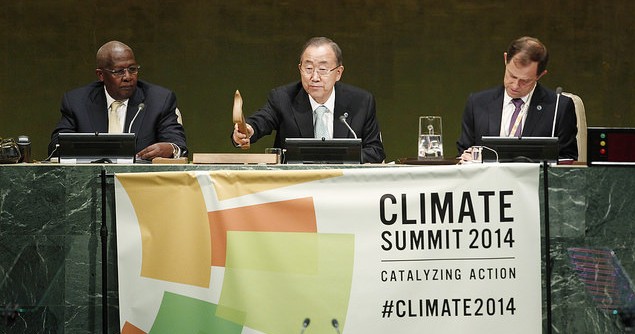Australia at the UN Climate Summit

During the UN Climate Summit on Tuesday, 23 September, UN Secretary General Ban Ki-Moon called upon 120 delegates to get “all hands on deck”, calling climate change the “defining challenge of our age”. The Summit aimed to galvanise global action on climate change, impelling national leaders to commit to strategies to accelerate progress on high-impact areas of climate change mitigation, including climate finance, energy efficiency, renewable energy and disaster risk reduction and resilience.
The talks in New York were expected to result in leaders announcing and committing to bold strategies in working towards climate change mitigation. Many countries stepped up to the plate, with US Secretary of State John Kerry promising that he was “personally committed to making sure this is front and centre of all our diplomatic efforts”. These announcements are expected to catalyse action on the ground from a range of private and public sector actors, such as businesses and government coalitions.
The World Bank pushed businesses and NGOs to put forward a range of new initiatives aimed to build multilateral cooperation towards climate change mitigation, while also announcing a 73-country commitment to put a price on carbon. Despite these bold statements, however, Australia was more restrained in its commitments.
Australian minister for foreign affairs Julie Bishop took the podium to call upon large emitters to shoulder much of the burden of mitigating climate change. She highlighted Australia’s expectation that developing countries should establish domestic initiatives aimed at reducing their emissions, with the help of $600 million in Australian aid. She also reasserted Australia’s commitment to reducing its emissions by 5% below 2000 levels by 2020, but emphasised the need to view emissions reductions with a view towards economic growth.
However, these commitments have been contrasted with Australia’s previous commitments of 5-25% in reductions and strong statements of commitment from other countries. Australia’s statement to the UN has so far been met with criticism, with pundits questioning Australia’s commitment to global climate change strategies. Critics argue that, Minister Bishop’s statements appear to overlook much of Australia’s own responsibility for domestic climate change emissions.
These debates illustrate the broad, long-term divisions over how much responsibility major emitters and developing countries should take for climate change initiatives.
Krislyn Tan and Radhika Roy are interns for the AIIA National Office working on the Konrad Adenauer Stiftung Roundtable.


